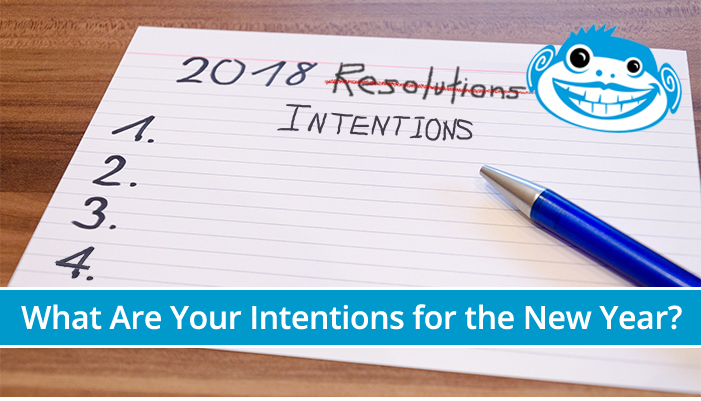Four in 10 Americans usually make New Year’s resolutions. Are you one of them?
According to Statistic Brain, top resolutions include getting healthier (21%), improving one’s lifestyle (12.5%), and making better financial decisions (8.5%). Of course, of those who do make resolutions, only 8% carry through on them. No matter how you look at it, that’s a pretty bad completion rate . . . or is it?
Maybe it’s not so much that people fail to follow through on a resolution, but that the resolution is too rigid, too inflexible, or too impractical in the first place. Needs, wants, expectations, and priorities shift throughout the course of a year. What you wanted to do or accomplish January 1 can look at lot different come spring. It’s a long year, and, in short . . . life happens.
Stay Nimble to Changing Conditions
As business owners and leaders, we establish goals for the upcoming quarter or year, and then we craft action plans to achieve said goals. But how often do we accomplish those goals exactly as we intended, without deviating from script along the way?
I must admit that much of the time, to achieve a certain business objective—either for my own firm or for a client’s—requires nimbleness and the ability to adapt to everchanging market conditions and expectations. Much of the time, the goal I thought was most critical to business success morphs into something else altogether before all is said and done.
I think it works much the same way for people who make New Year’s resolutions. Not everyone who is unable to maintain a resolution fails. Maybe the resolution was impractical to start with. Could you really expect to lose 50 pounds in four months? Or maybe becoming a self-made millionaire by June 1 was a little too ambitious.
Intentions vs. Resolutions
Let’s say you made a resolution to spend more time with your adult children. They’re in their early 20s, off to college or just embarking on their own lives, and you feel like you’re losing touch. So you resolve to spend more time with them, but lo and behold one of them gets a great job offer on the opposite coast. Away he or she goes, leaving your resolution in tatters.
Perhaps if you thought of such resolutions as “intentions” rather than 100% all -or-nothing resolutions, you’d realize that there’s room to adapt your resolutions/intentions such that, while you might not keep to them exactly as originally stated, you can more closely match what you intended to do and achieve a modicum of success along the way.
For example:
- You resolve to lose 50 pounds, but only lose 20. Clearly, you intended to lose weight, presumably to get healthier, and you did so. Good for you. Keep at it. Don’t let the fact you didn’t hit your exact weight goals make you consider your efforts a failure. The actual numbers are irrelevant. You intended to lose weight to be healthier and to feel better about yourself . . . and you did. Just because you didn’t achieve your stated goal doesn’t mean you’re a failure. It just means you definition of success is now a little different than intended.
- You resolve to spend more time with your adult child, but he/she moves across country. Between Skype, Facetime, and instant messaging, “spending time” can mean many things these days. Sure, it’s not the same being in the same room or the same zip code, sharing hugs and breathing the same air, but presumably you intended to spend more time with your child to improve your relationship. Even with the greater distance, you can still fulfill that intention – just in a slightly different way.
- You resolve to make “X” number of dollars by such-and-such a date, but you fall short. What you need to ask yourself is what was more important, achieving the actual numeric goal you established January 1, or achieving certain milestones or taking desirable business actions along the way. Sure, those actions/decisions may not have panned out exactly as you wanted, but as long as your business is moving forward, it’s safe to say you met the intentions of your resolution even if you didn’t match the dollar numbers desired.
Cats Get It!
While some may think my way of thinking about New Year’s resolutions is a bit like settling for lackluster results when the parameters of a resolution can’t be met, I like to think of it as living in a world where there are various gradations of success. Not everything is always black and white, achieve “X” or fail. There’s a lot of gray.
In our personal and professional lives, sometimes it’s OK to say, “I intend to achieve X, but if I can’t get there for various reasons, these alternate results are OK too.” They point is you tried, kept moving forward, and made progress—all the while staying positive.
In my book, that’s got the makings for a pretty good year—and if I didn’t know better, I’d say that sounded just like a New Year’s resolution . . . or at least an intention.
What New Year’s intentions have you made this year?
Share your thoughts with the Monkeyz community.
Paul June is King Monkey of BARREL O’MONKEYZ, a San Diego-based strategic marketing agency specializing in Sports and Active Lifestyle markets. We serve as a seasoned, outsourced marketing team for companies looking to ramp up sales and launch new products. Our barrel is full of talent and creative arms ready to prove we don’t just monkey around!

